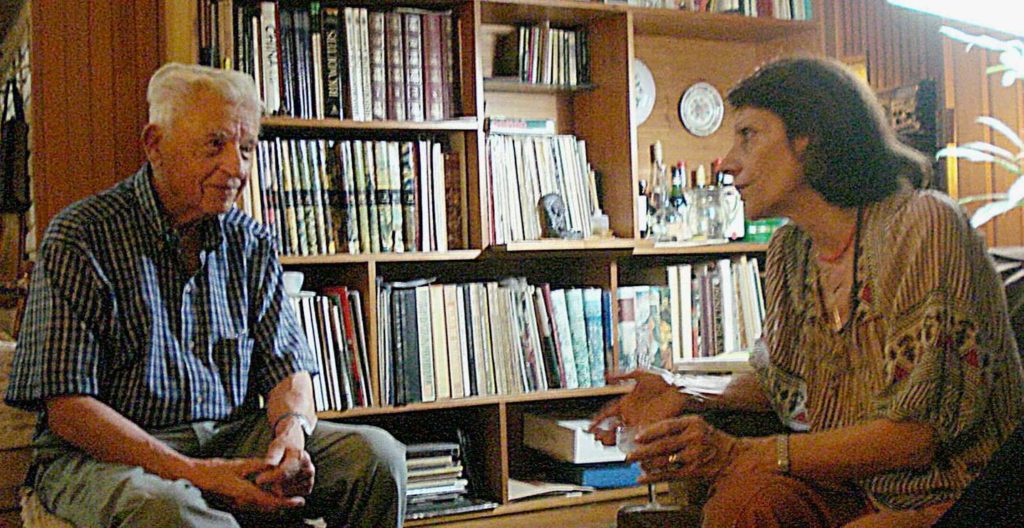You may know that each of us leaves traces wherever we go, and since no action ever goes to waste, traces are lasting and a matter of care. Charles François did it wonderfully as a pioneer and inspirational leader in his field of knowledge.
Born in Belgium, September 5th, 1922, Charles François studied consular and commercial sciences in Brussels and then, escaping from war, he joined his father in the Belgian Congo. Settled there, he developed his own business while continuing to study and writing chronicles about social issues.
A great reader, in the early 50ies Charles came to know the systems perspective by reading a novel in which one of its characters, the “connector”, always appeared when there was an issue or problem to solve by paying attention to the interrelated elements at play. By “connecting” the “apparent” fragments those problems faded away.
It was quite a lot, since no one lives isolated! Everything is connected to everything else in a complex and dynamic web of life.
Charles enjoyed the novel so much that he wrote a letter to the author, finding out that the novel was connected to the systems thinking world. Soon he was acquainted with Norbert Wiener´s foundational work “Cybernetics” and was exchanging letters with several systems researchers from the International Society for the Systems Sciences: Ludwig von Bertalanffy, Ralph Gerard, Kenneth Boulding, Anatol Rapoport, James Miller and Ross Ashby among others. But then, in the early sixties he realized he had to leave the Congo.
At the time Charles was among the few Belgians who had friends among the indigenous people, he even was personally acquainted to Lumumba, who later became the first elected Prime Minister of the Republic of the Congo. Having firsthand knowledge of the political upcoming he passed his business to his local friends, moved his family back to Belgium and explored Argentina, where he then settled down in Mendoza, capital city of the Mendoza province.
There he established a toyshop in a strategic location of the city, and soon later inside that shop, also an informal post office to serve the exchanges among the Belgian consul of that province and his fellow citizens in the area. It turned out that after a few years the business failed, just at the time when that consul also passed away.
To arrange everything properly Charles came to Buenos Aires and explained the issue of the post office to his country’s embassy officers. They didn’t say much, but a few days later the ambassador called offering him a position, which Charles held until his retirement, never moving to another country again.
During those 21 years serving at his country’s embassy Charles made sure each new arriving ambassador knew that he was not a career diplomat, always having in mind that Argentina was his chosen country of residence. He also let them know about his enthusiastic engagements contributing to the systems thinking community.
In the early 70ies Charles François began to give lectures and tutorials within the Argentine Scientific Society that soon resulted in the emergence of a research group: the GESI. Then, in 1976 he founded and was elected president of the Argentine Association for the Study of Systems and Cybernetics, always known as GESI, the Argentine Branch of the International Society for the Systems Sciences (ISSS) and founder member of the International Federation for Systems Research (IFSR). Being the mentor of this organization he acted as its honorary president till he passed away, in July 31, 2019.
After its discovery through the “connector” character, the systems perspective became his way of life, his philosophy and his passion. Charles actively disseminated this knowledge throughout Latin America, and so nowadays many professors and researchers work using that perspective and its methodologies in universities all over the region, from Mexico to Ushuaia, in Southern Argentina.

Teaming with his wife Gloria, his unconditional collaborator, Charles was an inspirational leader, encouraging others, listening attentively, asking relevant questions and guiding the path into knowledge, always with gentle genuine smiles. Economics, sociology and prospective were his main subjects of interest and study, which he always addressed from the systemic-cybernetic perspective, writing articles and books using its language and semantics.
Kind and curious Charles established and cultivated many relationships in the system thinking community gathering knowledge about systems and cybernetic concepts, even while in development. Throughout the years he systematically exchanged letters with authors, took part in editorial boards of main journals and usually participated at the Fuschl Conversations, organized by the IFSR, in Austria, were he gladly took the opportunity to strengthen bonds with other curious and brilliant fellows.
A masterpiece ripened over the years. In 1997 the first International Encyclopedia of Systems and Cybernetics authored by Charles François came into being: a cornerstone that later, in 2004 was enlarged to two volumes. Note that since Charles always cared for his Spanish speaking community, a smaller version is also available in Spanish, as a dictionary. There are good news! A work in progress, a project led by the Bertalanffy Center for the Study of Systems Sciences, to make the Encyclopedia accessible on the Internet. Most probably new enlargements will follow.
Here a related entry:
